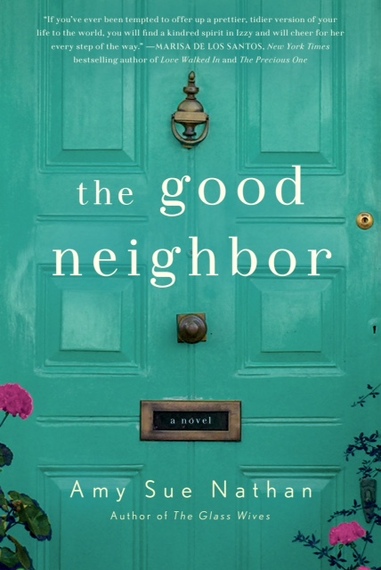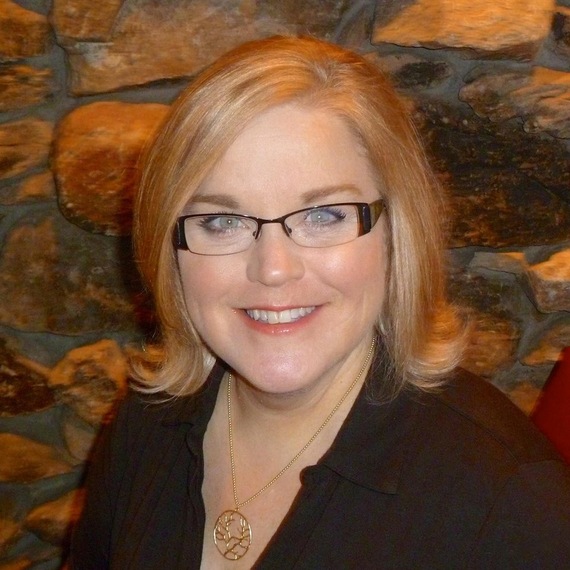Like many writers, I was first introduced to Amy Sue Nathan through her wonderful site, Women's Fiction Writers, which has become one of those essential go-to sites for writers seeking out conversations on every topic imaginable by a broad spectrum of novelists. I wrote a guest post for her, and from there, Amy and I began communicating via Facebook and email, then progressed to phone calls where we realized we had many things in common: divorce, a love of dogs, kids going off to college. When I realized she lived near Chicago and I could meet her in person on the way to visit family in Wisconsin, I was ecstatic but anxious: what if the "real" Amy didn't live up to her online persona?
I needn't have worried. Amy is as lively, generous, good-humored and clever in person as she is online. Tomorrow her second novel, The Good Neighbor--an incredibly fun read--will be released, so I thought it would be fun to celebrate her pub date with an interview that turns the tables on Amy and puts her in the spotlight this time. Here, she talks about everything from how writers can use social media effectively to why books are like M&Ms. Read on! If you aren't an Amy Sue Nathan fan yet, you will be after this.
Q. I'm a big fan of your books because you tackle emotional conflicts that so many women face, like divorce, death of a spouse, betrayals by friends, financial stress and the complications of single parenting. Yet, your books are never downers, because they're so rich with humor and sharp social observations. You make it possible for readers to relate easily to your protagonists as they handle various challenges...keep 'em coming!
A. You are way too kind - and thank you!
Q. As someone who seems to embrace the category of "women's fiction" in all its forms, tell us how you define this genre--and why you chose it as your own.
A. To me, women's fiction is an umbrella term, but in its purest form it's a book about a woman where her journey is to better herself through self-discovery. If romance is part of that, great. If not, that's fine. Even with women's fiction that's heavier on romance, the women are handling things on their own and the end-all-be-all is not to be with a man. Women's fiction is a character-driven journey where the protagonist saves herself.
Q. Obviously, the publishing industry has undergone some significant transformations in recent years. Can you talk a little about how those changes have affected you most directly?
A. My book publishing journey started in 2011 when my debut novel sold to St. Martin's Press. So in publishing years, that's not too long and I came in when e-books and e-readers were already somewhat normal, although not quite so thin and light and diverse as they are now. In terms of what I've seen as a freelance writer for newspapers and magazines? Well, that's different. Fewer assignments, dwindling pages, lower pay.
Q. This is your second novel, and now you're working on a third under contract with a major publisher. Congratulations! As you've asked so many other authors in your blog, I'd love to know whether you're a plotter or a "pantser," and how your writing process has changed with each novel.
A. I'm a PLANTSER! A little bit plotter and a little bit pantser. Or a lot of each, depending on the day.
The way I write first drafts has changed a lot. For my first novel, I'd write and write and when I'd stop, I'd write a few sentences about what came next. No outline, no timeline, no character notes. All that came later. For The Good Neighbor I worked from a twenty-page outline but deviated quite a bit in the first draft. For Left To Chance, my third novel coming out in 2017, I'm writing scenes out of order and following an outline that consists of post-it notes and index cards but things changed right away. I always let my heart guide the first draft, however I approach it. For subsequent drafts I'm more methodical and I go very slowly, making sure everyone is where they should be doing what I want them to be doing. The best part, of course, is when they surprise me.
Q. In The Good Neighbor, you offer us a unique--and often very funny--tale of a blogger who spins an increasingly far-fetched fiction about who she is and how she lives. I love the very concept of this book. How did you come up with it?
A. I'll tell you a secret no one knows yet (unless they've read the acknowledgments). The idea for the book grew out of a 1945 Christmas movie starring Barbara Stanwyck, called Christmas in Connecticut. It's a hoot! If you haven't seen it, I highly recommend it any time of year. The movie is about - you guessed it, Elizabeth Lane (same name as my main character, although she goes by Izzy) who is a magazine columnist writing about her happy married home life in a Connecticut farmhouse, her cooking, housekeeping, and parenting tips, since she has a young child. Except she doesn't! This Elizabeth Lane is a single gal in New York City who can't even boil a pot of water. Hilarity ensues.
So, you can see where I got the idea for a blogger who tells a story that gets out of hand! I set the story in a Northeast Philadelphia neighborhood because that's where I grew up and I so wanted to write about it, without placing the characters in the 1970s. So Izzy grew up on a street like mine, but in the 1980s, and that's where she moves back to with her young son.
And no, I did not move back home with my kids after my divorce, in case you were wondering!
Q. As a popular blogger yourself, what's your view on how authors can use social media to their advantage in marketing their books? Do you find that you use social media differently now than when you first began your Women's Fiction Writers web site and published your first novel?
A. I started blogging in 2006 as a "mommy blogger" when social media, for me, consisted of reading and commenting on all kinds of blogs on a daily basis. This led me to my philosophy of social media. GOOD CONTENT. If you're interesting, funny, informative, unusual or any combination thereof, you can attract some attention - IF AND ONLY IF--you're willing to give attention in return. With social media one must be SOCIAL. Throwing content into the internet winds and not expecting it to just blow back on your face is naïve.
Q. Probably few other authors have been as supportive of their sister authors has you have been through the years. (I include myself in that lucky category!) I imagine that you've done this in spite of suffering the same crises in confidence and even pangs of envy the rest of us experience from time to time. What strategies do you use to keep pushing yourself to write during those dark hours of doubt?
A. Thank you! I am kind of programmed to help other writers and have been doing that since long before I had an agent or book contract. It inspired me to be around (virtually) other writers, published and not. Honestly, even when I'm a little green with envy I remember that no one reads just one book. If readers like your books, Holly, maybe they'll also like mine. And if they like mine, maybe they'll like another author's. And so on. I truly believe there's room for everyone who writes whatever someone wants to read. Books are like M&Ms. One is not enough.
Do I compare myself to other authors? Sure. But I know I shouldn't. Do I know there are disparities in publishing? Sure. When it comes down to it, I also know that while I've worked my tail off to get where I am, so have many others who, for whatever reason, won't sign with an agent or get a publishing contract like I have.
Q. Do you have any advice for debut or aspiring authors?
A. Many people care a lot about your writing and your book. But no one cares as much as you do.


